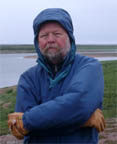
The Dave
Foreman Forum on the Wild
Side News
Learn
more about Dave Foreman at The Rewilding
Institute www.rewilding.org
Dave
Foreman Bio
 "Around
the Campfire" ~
Issue Four~ "Around
the Campfire" ~
Issue Four~
"The
Human Population Explosion and Biodiversity"
Dave
Foreman, the "Godfather" of EcoAction shares his
thoughts on the shortcomings of the some of the solutions
being proposed to deal with overpopulation by allies in the
conservation and environmental communities. Dave has some direct
advice and a few warnings.
 Dave Foreman "The Angry West" Dave Foreman "The Angry West"
2005: Nature’s Crisis / Dave
Foreman, March 24th, 2005
 Listen
to Dave Foreman's "2005: Nature's Crisis"
commentary. Listen
to Dave Foreman's "2005: Nature's Crisis"
commentary.
In my 35 years as a conservationist, I have never beheld such a bleak and depressing situation as I see today. The evidence for my despair falls into three categories: the state of Nature, the power of anticonservationists, and appeasement and weakness within the conservation and environmental movements. I fear that on some level we must recognize that this state of affairs may be inevitable and impossible to turn around. That is the coward’s way out, though. The bleakness we face is all the more reason to stand tall for our values and to not flinch in the good fight. It is important for us to understand the parts and pieces of our predicament, so we might find ways to do better.
The State of Nature
I’ve just authored a book, Rewilding North America, which goes into considerable detail describing and trying to understand the Seven Ecological Wounds that drive the Sixth Great Extinction, which is the fundamental fact and problem in the world today. Around the world, direct killing of wildlife, habitat destruction, habitat fragmentation, loss of ecological processes, invasion by exotic species and diseases, ecosystem pollution, and catastrophic climate change are worsening. We six-and-a-half-billion too-clever apes are solely to blame. Despite impressive successes here and there, the overall state of Nature continues to decline. This is simple reality, despite the scolding we hear not to be doom-and-gloomers.
Power of the Anticonservationists
In the United States, the federal government has become the sworn enemy of conservation. Not only has the radical-right Presidency and Congress stopped any progress in the conservation and restoration of Nature, they are dedicated to overthrowing the twentieth century’s legacy of conservation and environmental policy and programs. They are unabashedly trying to go back to the unfettered, uncaring era of the robber barons in the late nineteenth century. This revolution is both philosophical and practical. Bad as this is, the radical-right is also dedicated to shredding science, particularly biology, and time-traveling back to before the Enlightenment.
While the United States is an extraordinary political case, elsewhere some of the supposedly most civilized nations on the planet, such as Canada, Norway, and Japan, are again waging nineteenth-century crusades against wild Nature: frontier-forest mining, slaughter of troublesome animals (such as seals, wolves, bears), and commercial whaling, just for starters. Japanese, European, Chinese, and American businesses are looting the last wild places for timber, pulp, wildlife, minerals, and oil, opening up such places to further habitat destruction and bushmeat hunting by local people.
Although the radical-right control of the U.S. Presidency and Congress was gained by a very small margin in 2004 (no mandate), it is backed by powerful and popular forces and by a shocking descent into prescientific irrationality by large sections of the public.
Appeasement and Weakness in the Conservation and Environmental Movements
The efforts to protect wild Nature and to clean up pollution face internal subversion from the right and left that leads to deep compromises not only on issues but also on fundamental principles. We can stuff these calls to compromise into several boxes, including sustainable development, resourcism, Nature deconstruction, politically correct progressivism, and anthropocentric environmentalism.
First, some brief definitions: conservation is the movement to protect and restore wildlands and wildlife (Nature for its own sake); resourcism or resource conservation is the resource extraction ideology of the U.S. Forest Service and other agencies (multiple-use/sustained yield); environmentalism is the campaign to clean up pollution for human health and make cities livable.
The radical right has been disciplined about thinking and acting for the long term; we have failed in part because we do not have a long-term strategy to which we stick.
Internationally since the 1980s, conservation efforts to protect wildlands and habitat by means of national parks, game reserves, and other protected areas have been severely compromised as financial-aid agencies and even some top international conservation groups have shifted to promoting so-called sustainable development and community-based conservation. Although these approaches are sometimes sound conservation tactics, in practice they have elbowed Nature into second place. This establishment undercutting of Nature conservation has been joined by the leftist passion of some anthropologists and other social engineers to reject protected areas in favor of indigenous extractive reserves. Shockingly, sustainable development is coming close to dominating the pages even of publications about conservation biology, and gains more and more adherents in resource management graduate schools and large “conservation” organizations. Some members of the academic left have become deconstructors of Nature, denying that it independently exists, proclaiming that we invent it; therefore there is no reason to protect it.
Pressured from the left and right during the last twenty-five years, conservation and environmental organizations worldwide have moved away from forthright calls for zero population growth, even though human overpopulation is the underlying cause of all conservation and environmental problems. We hear a growing drumbeat that there is a dearth of births and that developed nations face economic collapse because of fewer young people. We are essentially silent in response to this cornucopian madness. Similarly, the conservation and environmental movements in general shy away from acknowledging the reality of human-caused mass extinction. If we don’t even clearly state the problem, how can we do anything about it?
We can also see a shift in the U.S. from conservation to resourcism among several prominent and influential entities. Once the preeminent conserver of biological diversity, The Nature Conservancy has been steadily moving to a resourcist approach. They talk now of “working landscapes,” a fancy euphemism for logging and livestock grazing, and demand that their employees talk about people instead of Nature. High County News, once a feisty voice for grassroots conservationists in the West, has steadily turned into a voice for resourcism: not the preservation of wilderness, but the preservation of happy little resource-extraction communities, and for negotiated settlements between conservationists and resource-extraction industries, which usually favor industry.
Some consultants, foundations, and political realists are urging grassroots wilderness groups to compromise in order to pass wilderness legislation that may or may not adequately protect existing wilderness. This encouragement of appeasement is based on a desire to pass bills, and an overreaction to the narrow victory of the radical right in the 2004 election. Another source for this push to compromise is the fuzzyheaded wish that if people only talk together, everything can be worked out.
Several bright young men have gained a disturbing amount of attention with their recent speeches about the “death” of environmentalism. Insofar as they consider Nature protection at all, they demand that conservationists drop their priorities to focus on social justice and other anthropocentric progressive causes. Overall, they call on environmental organizations to essentially go out of business and just become part of the progressive wing within the Democratic Party. The overwhelming identification of environmentalism with the progressive movement and the Democratic Party is a key reason that it lacks credibility with much of the American public.
Just as there has been a disturbing shift in attitudes among large segments of the American public, so have there been problematic changes among members of the conservation public. To be blunt, many of the employees and activists with conservation groups are ignorant of our history and have not read the classic books of conservation. There is an appalling lack of intellectual curiosity in the movement. On the whole, the radical right and grassroots anticonservationists both read and think more than do conservationists and environmentalists. As far as outdoor recreation goes, young people, who once would have been hikers and backpackers, now seek thrills on mountain bikes and thus cut themselves off from experiencing Nature and from having self-interest in protecting roadless areas. I don’t see kids out messing around in little wild patches; they’re inside, plugged in to a virtual reality.
These are trends. Of course there are exceptions. Dwelling on the exceptions, though, keeps us from doing something about the real problems. I’m not doing “nuance” here. This sober, unapologetic cataloging of the array of problems Nature conservationists face is, I am convinced, the first step in developing a more effective strategy.
In December of 1776, the American Revolution was in its darkest hour. In response, Tom Paine wrote his first “Crisis” paper:
These are the times that try men’s souls. The summer soldier and the sunshine patriot will in this crisis, shrink from the service of his country; but he that stands it now, deserves the love and thanks of man and
woman.
General Washington had the paper read to his miserable, disheartened troops in their frozen winter camps. There was no surrender. Years of hard battle lay ahead but victory was gained.
We need Tom Paine conservationists in our dark hour. Let us not apologize for loving wild Nature, for caring about other species, for speaking the truth. Reach out to others. Make deals when they are good deals. But let us not be frightened and browbeaten into appeasement. Let us instead offer a bold, hopeful vision for how wilderness and civilization can live together.
Dave Foreman, Chairman and Executive Director
The
Rewilding Institute
March 24, 2005
Dave
Foreman: bio back
to top
Dave
Foreman has worked as a wilderness conservationist since 1971.
From 1973 to 1980, he worked for The Wilderness Society as Southwest
Regional Representative in New Mexico and as Director of Wilderness Affairs in
Washington, DC. He was a member of the board of trustees for the New Mexico
Chapter of The Nature Conservancy from 1976 to 1980. From 1982 to 1988, he was editor of the Earth First! Journal. Foreman
is a founder of The Wildlands Project and was its Chairman from 1991-2003 and
executive editor or publisher of Wild Earth from 1991-2003.
He is now the Executive Director and Senior Fellow of The
Rewilding Institute, a conservation “think tank” advancing ideas of
continental conservation. He was a
member of the national Board of Directors of the Sierra Club from 1995 to 1997
and is currently a member of the Board of Directors of the New Mexico Wilderness
Alliance. He speaks widely on conservation issues and is author of The
Lobo Outback Funeral Home (a novel), Confessions
of an Eco-Warrior, and The Big Outside
(with Howie Wolke). His new book, Rewilding
North America, was published in 2004. Foreman
is the lead author and network designer of the Sky
Islands Wildlands Network Conservation Plan and the New Mexico
Highlands Wildlands Network Vision from The Wildlands Project.
He received the 1996 Paul Petzoldt Award for Excellence in Wilderness
Education and was named by Audubon Magazine in 1998 as one of the 100 Champions of Conservation
of the 20th Century. He is
considered one of the most effective and inspirational public speakers in the
conservation movement. Foreman is a
backpacker, river runner, canoeist, fly-fisher, hunter, wilderness and wildlife
photographer, and bird-watcher. He
lives in his hometown of Albuquerque, New Mexico. For more information see www.rewilding.org
|
